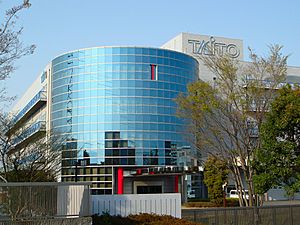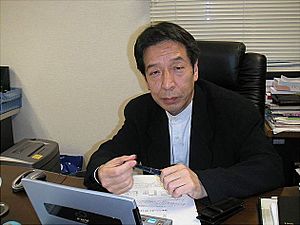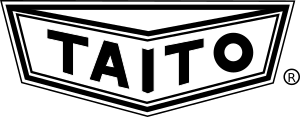Taito facts for kids

Logo used since 1988
|
|

Taito shares its headquarters building (in Shinjuku) with its parent company, Square Enix.
|
|
|
Native name
|
株式会社タイトー
|
|---|---|
|
Romanized name
|
Kabushikigaisha Taitō |
|
Formerly
|
Taito Trading Company |
| Subsidiary | |
| Industry | Video games Arcades Toys |
| Founded | August 24, 1953 |
| Founder | Michael Kogan |
| Headquarters | Shinjuku,
,
Japan
|
|
Key people
|
|
| Products |
|
| Total equity | |
|
Number of employees
|
752 (March 2020) |
| Parent | Square Enix (2005–present) |
| Subsidiaries |
|
Taito Corporation is a Japanese company. It makes video games, toys, and arcade cabinets. Taito also runs game centers. Its main office is in Shinjuku, Tokyo.
The company started in 1953. A businessman named Michael Kogan founded it. Back then, it was called Taito Trading Company. They imported things like vodka and vending machines. Taito began making video games in 1973. In 2005, Square Enix bought Taito. By 2006, Taito became a full part of Square Enix.
Taito is famous for its early video games. They made many popular arcade games. Some of these include Speed Race (1974), Western Gun (1975), and Space Invaders (1978). Other hits are Bubble Bobble (1986) and Arkanoid (1986). Taito was one of the first Japanese game companies to send its games to other countries.
Space Invaders was a huge success. It helped video games become very popular in the late 1970s. The aliens from the game are still famous symbols in the game world. Today, Taito has arcade centers called "Taito Game Stations" across Japan. They also make toys, plush dolls, and prizes for arcade claw machines.
Contents
Taito's Journey: From Imports to Games
Michael Kogan, a businessman, started a company in Shanghai in 1944. It was called Taitung. He later moved to Japan.
Starting Up: The 1950s and 1960s
After moving to Japan, Kogan started a new business. On August 24, 1953, he founded the Taito Trading Company. At first, Taito made vodka. It was the first company to do so in Japan. They also imported peanut vending machines.
Later, Taito stopped making vodka. They focused on vending machines and importing jukeboxes. They bought broken jukeboxes from US military bases. Then, they fixed them up. As Japan's economy got better, Taito became a main seller of AMI jukeboxes. By 1960, they had sold over 1,500 machines.
In the 1960s, Taito started making electronic-mechanical games. These games used electronic parts. One game was Crown Soccer Special (1967). It was a two-player soccer game. Another was Crown Basketball (1968). It was very popular in the US.
The Video Game Era: 1970s and 1980s
In August 1972, Taito Trading Company changed its name. It became Taito Corporation. They also opened a branch in America in 1973.
Taito's First Video Game
Taito's first video game was Elepong. It was a ping-pong arcade game. It came out in Japan in 1973.
Tomohiro Nishikado was a key person in Taito's move to video games. He joined Taito in 1968. He helped create popular shooting games. His bosses wanted him to learn about new electronic technology.
Nishikado studied Atari's Pong game. He learned how its computer chips worked. This helped him create Taito's own Pong-style games. These included Soccer and Davis Cup in 1973. He then made other arcade hits. These were TV Basketball (1974) and Speed Race (1974). He also made the shooting game Western Gun (1975).
In 1978, Nishikado created Space Invaders. This game became Taito's most famous title. It was one of the most popular arcade games ever. It helped start the "golden age" of arcade games. Michael Kogan, the founder, passed away in 1984. His son, Abraham Kogan, became chairman.
In 1986, Taito joined with two other companies. These were Pacific Industrial Co., Ltd. and Japan Vending Machine Co., Ltd. Japan Vending Machine had been bought by Taito in 1971. Pacific Industrial was created by Taito in 1963.
Modern Times: 1990s to Today
In 1992, Taito planned a new video game console. It was called WOWOW. This console would let people play arcade games at home. It would also let them download games from a satellite. But the WOWOW console was never released.
Taito's American branch closed in 1996. Taito had already sold the rights to publish its games in America. A European branch in London also closed in 1998.

In August 2005, Square Enix announced a big purchase. They bought most of Taito's shares. This made Taito a part of Square Enix. Square Enix wanted to grow Taito's business. They also wanted to get into arcades and other entertainment. By September 2005, Square Enix owned most of Taito. In March 2006, Taito became fully owned by Square Enix.
In 2010, Taito changed its structure. Its home video game part became a separate company. This company was called Taito Soft Corporation. But it soon joined Square Enix. Now, Square Enix publishes all of Taito's games for home consoles in Japan.
The current Taito Corporation was formed in 2010. It combined with another company called ES1 Corporation. This new Taito focuses on arcade and mobile games. On November 30, 2016, Taito announced that Space Invaders and Arkanoid would be available on Facebook.
In July 2018, Taito shared exciting news. They announced they would start making games for home consoles again. They want to bring their classic games to new platforms. They also plan to create new games for consoles in the future.
See also
 In Spanish: Taito Corporation para niños
In Spanish: Taito Corporation para niños
- List of Taito games
- Taito of Brazil



